Top 12 workflow automation software options for teams and businesses in 2023
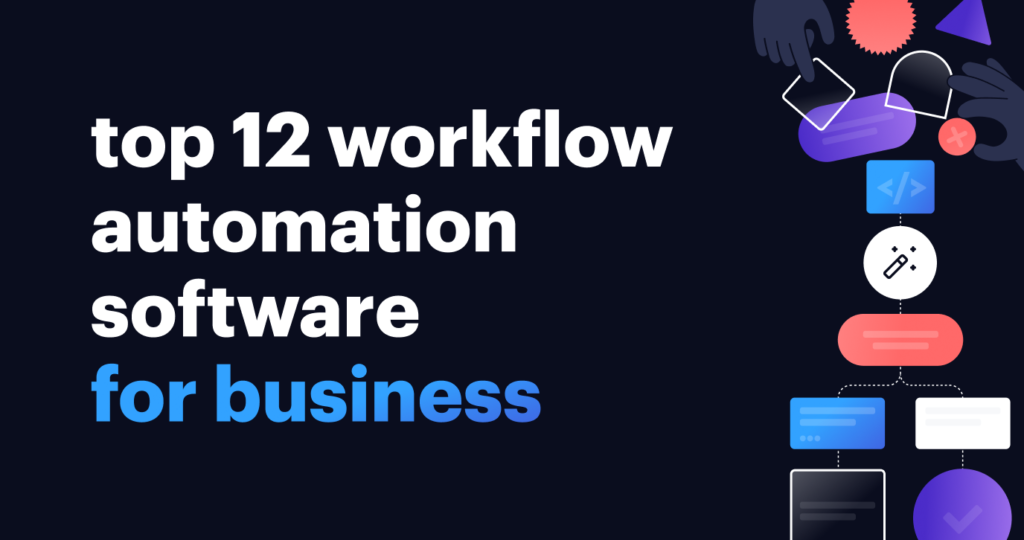
Businesses and teams of all sizes are seeking to enhance their company’s productivity and efficiency. Payment collection, document distribution, data transfer, or any other regular repetitive task, if performed manually, takes a lot of time and is error-prone.
According to McKinsey, manual tasks comprise up to 45% of the daily activities individuals perform. Using workflow automation software make it possible to automate these tasks and minimize human involvement. While a universal, all-in-one solution is still hard to find, the market is currently saturated with workflow automation solutions that tackle a range of processes.
In this blog, we’ll provide you with the most accurate comparison of the top 12 workflow automation solutions worth adopting in 2023.
Take note: We’ve created this blog based on information found on each solution’s official website as well as resources such as G2, TrustRadius, and GetApp.
Popular automation solutions overview
Today’s automation software market is saturated with solutions that meet every taste and budget. Like anything else, though, they each come with their own strengths and weaknesses.
In order to select the best automation solution to fit your business needs, it’s important to analyze them according to the following criteria:
- features (which depend on the user category you belong to: SMB, enterprise, freelancer, etc.)
- capabilities
- purposes and industry specifics
- subscription plans
To help you avoid getting lost in the variety of workflow automation solutions available, we’ve compiled a list of the most popular with a summary of highlights for each.
1. airSlate
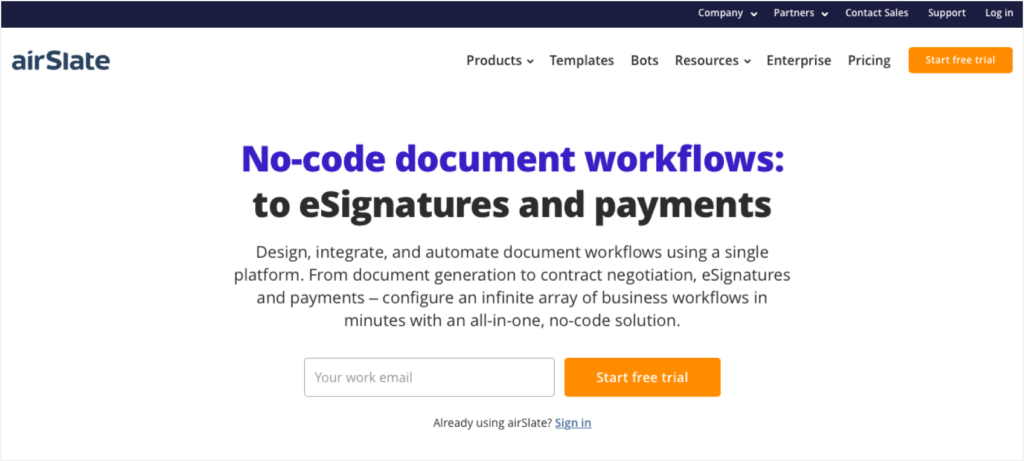
G2 rating: 4.7 / 5
TrustRadius rating: 9.3 / 10
airSlate is an all-in-one, enterprise-grade, no-code platform for automating document workflows at any scale.
Key features:
airSlate combines all the products and features users need to automate their business workflows without writing a single line of code: web forms creation, document generation, signNow’s eSignature solution, pdfFiller’s PDF editing tool, drag-and-drop workflow visualization, end-to-end contract management, integrations with external systems, and more.
Customers:
airSlate is best recommended for small and mid-sized businesses. Regardless of industry, airSlate users can create workflows from scratch or use premade templates for almost any document workflow (e.g., sales invoicing, employee onboarding, patient intake, student enrollment, etc.).
Pricing:
airSlate offers its users four pricing plans:
- Starter ($19/month, 500 Bot actions/year, 200 documents/year, no-code workflow creator, document generation, legally-binding eSignatures, and more)
- Growth ($79/month, 2,000 Bot actions/year, everything in Starter + unlimited documents, advanced roles and permissions, contract negotiation, payment collection, API, and more)
- Enterprise ($399/month, 10,000 + 1,000 extra Bot actions/year, everything in Growth + dedicated integration apps for Salesforce, NetSuite, etc., HIPAA-ready, SAML/SSO, and more)
- Automation Suite ($799/month, 20,000 + 4,000 extra Bot actions/year, everything in Enterprise + includes features of pdfFiller (professional online editor), signNow (eSignature solution), USLegal (library of legal forms), and a dedicated Customer Success manager.
Education is among the top industries using airSlate. Fresno Pacific University, for example, was regularly processing thousands of employment contracts that required signatures from multiple parties. airSlate enabled FPU to automate this process from beginning to end with a seamless Salesforce integration, switching their workflows from manual and paper-based to hands- and error-free.
I was super excited about all the possibilities with the airSlate platform just because of all the different things that could be done with it. Still, the eSignature piece was the most important part for us. airSlate is one of those tools that I feel like we’re using a fraction of what it can do. It’s a gigantic toolset, and we’re using just one of all the many things [it has to offer]. But it does really well. It is rock-solid, and it helps — it’s great!
– Jeffrey Jones, Director of Information Systems at Fresno Pacific University
2. Kissflow
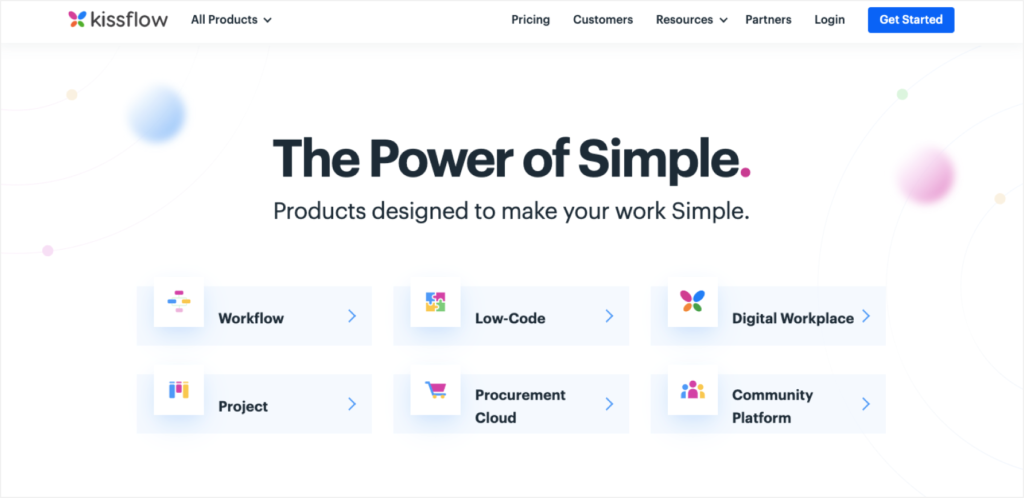
G2 rating: 4.3 / 5
TrustRadius rating: 8.1 / 10
Kissflow is a workflow automation software that offers a comprehensive solution for businesses to create automated workflows in HR, finance, marketing, sales, procurement, and administration departments.
Key features:
Kissflow offers automated workflow routing, third-party integrations, visual workflow designing, service-level agreements, ticketing system, reporting, analytics, etc.
Customers:
Kissflow is primarily aimed at small companies and teams that are eager to implement workflow automation into their business processes but are new to the technology. The solution is simple and user-friendly.
Pricing:
Depending on the number of users and functionality, Kissflow offers the following plans:
- Basic ($200/month for 20 users)
- Advanced ($495/month for 50 users)
- Fully Loaded ($1,900/month for 100 users)
- Enterprise (a custom option that is determined individually with Kissflow’s sales team)
3. Formstack
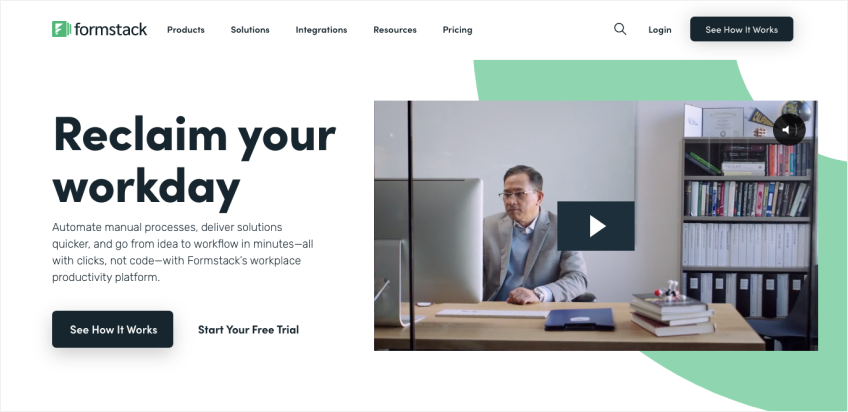
G2 rating: 4.4 / 5
TrustRadius rating: 8.6 / 10
Formstack is a workplace productivity platform that enables businesses to streamline their digital work using online forms, documents, and signatures.
Key features:
In addition to their workflow automation platform, Formstack offers its users other products, such as online forms, documents generation, digital signature, and integrations with third-party systems.
Customers:
Formstack is suitable for businesses and teams of all sizes and is especially useful for sales and marketing functions.
Pricing:
Formstack’s subscription plans differ in terms of features and number of users/templates based on each product. The following plans include prices per month that are billed annually.
- Forms (Starter: $50, Teams: $83, Pro: $208, Enterprise: customized for users)
- Documents (Starter: $92, Teams: $184, Pro: $367, Enterprise: customized for users)
- Signature (Starter: $16/user, Pro: $26/user, Enterprise: customized for users)
- Platform (Starter: $360, Pro: $630, Enterprise: customized for users)
- Formstack for Salesforce (Starter: $225, Pro: $585, NativeCloud Pro: customized for users)
4. Nintex
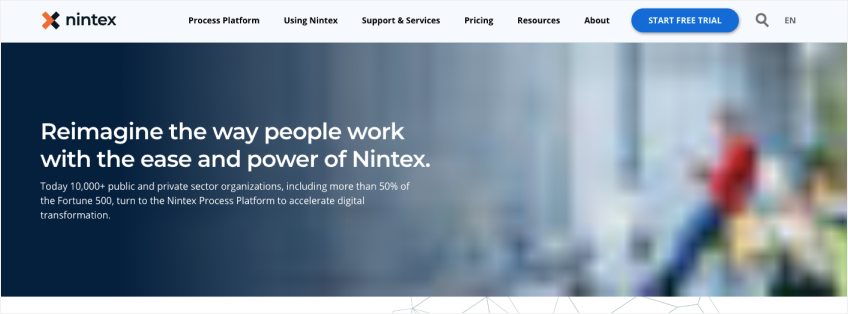
G2 rating: 4.2 / 5
TrustRadius rating: 8.5 / 10
Nintex is a process management and workflow automation platform that allows users to visually manage, automate, and optimize their business processes and workflows.
Key features:
Nintex offers its users advanced automated workflows, document generation, integrations with external systems, robotic process automation, analytics, and more.
Customers:
Nintex has been designed for enterprise businesses with established processes. The solution is primarily recommended for such departments as financial and legal services, human resources, law, and IT outsourcing.
Pricing:
Nintex provides two subscription plans per offering, as follows:
- Nintex Workflow Standard (starts at $910/month for 10 workflows with an unlimited number of users)
- Nintex Workflow Enterprise (includes RPA and starts at $1,400 for 10 Workflows/Botflows with an unlimited number of users)
- Nintex RPA Standard (starts at $90 per user/month)
- Nintex RPA Enterprise (starts at $140 per user/month)
5. Zapier
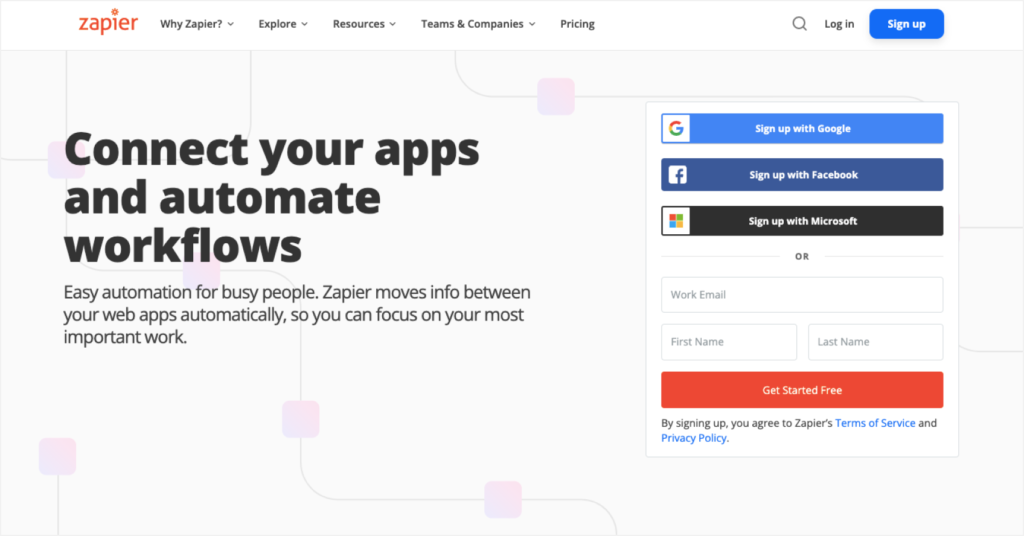
G2 rating: 4.5 / 5
TrustRadius rating: 9.1 / 10
Zapier is a workflow automation tool that enables users to connect the tools and apps they are already using, allowing them to work together without manual interference.
Key features:
Zapier’s key operating principle is based on “if-this-then-that” conditional logic. The solution offers its users extendable workflows, built-in actions, branching logic, and third-party integrations.
Customers:
Zapier’s target audience is freelancers and small-to-medium businesses that use multiple tools that are not “talking” to each other. Service and marketing departments are the ones for whom Zapier is the most beneficial.
Pricing:
The subscription plans Zapier offers depend on the number of tasks performed in a month and the variety of features available. The below pricing applies to their annual billing option:
- Free plan ($0; includes up to 100 tasks/month with a very limited functionality)
- Starter plan ($19.99; includes 750 tasks/month)
- Professional ($4; includes 2,000 tasks/month)
- Team ($299; includes 50,000 tasks/month)
- Company ($599; includes 100,000 tasks/month).
6. Zoho
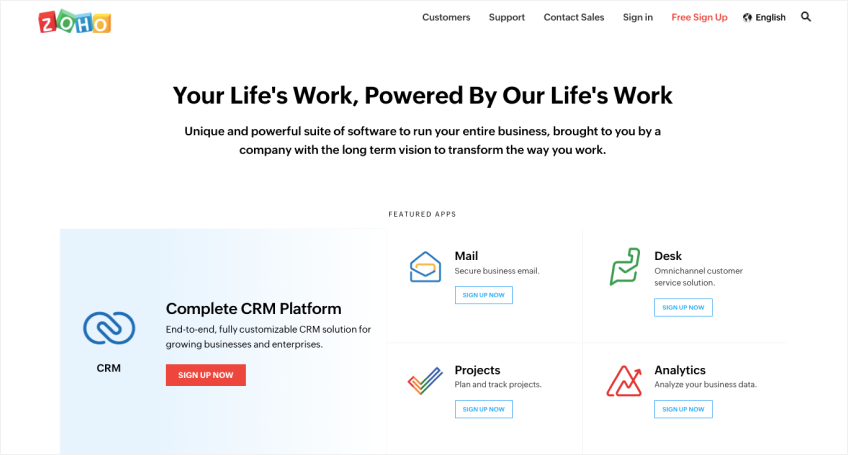
G2 rating: 4.1 / 5
TrustRadius rating: 8.3 / 10
Zoho is a comprehensive, customizable customer relationship management solution for growing businesses and enterprises.
Key features:
Zoho offers its customers a line of products including a complete CRM platform, a pipeline-centric CRM for small businesses, an online form builder for data collection, and an email service for salespeople.
Customers:
Zoho is targeted at growing businesses and enterprise companies in various industries but primarily within sales and marketing functions.
Pricing:
Zoho users can choose between four subscription plans differing functionality:
- Standard (€20/month)
- Professional (€35/month)
- Enterprise (€50/month)
- Ultimate (€65/month)
7. Integrify
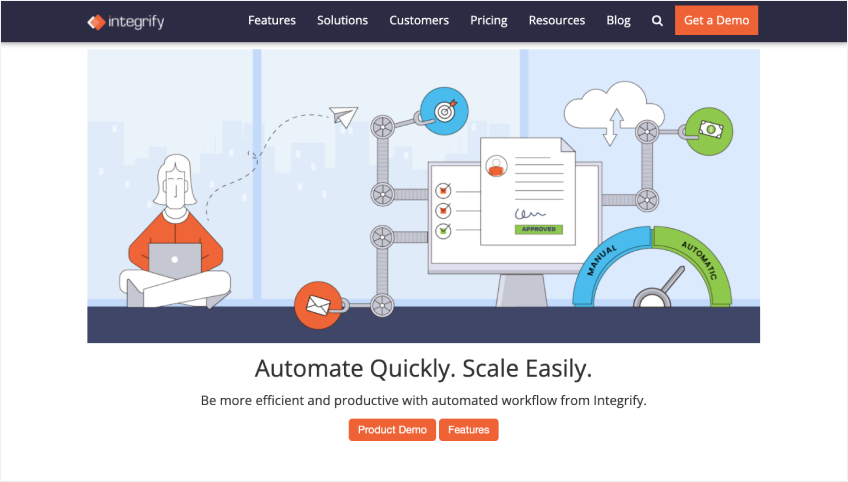
G2 rating: 4.4 / 5
TrustRadius rating: 9.8 / 10
Integrify is a workflow management and automation software that allows users to create custom documents and file approval workflows and streamline document routing and tracking.
Key features:
Integrify offers its users a number of features, namely, a visual process builder, an online form designer, a service portal, an audit trail, and an API.
Customers:
Integrify is recommended for enterprises and SMEs, as well startups and freelancers in various fields (e.g., healthcare, education, banking).
Pricing:
Integrify pricing is subscription-based (monthly or annually) and starts at $38/user with a minimum contract term of one year. Plans start at 25 users ($11,400 annually). A user is anyone who needs access to the system to submit requests, provide approvals, manage tasks, etc.
8. Workato
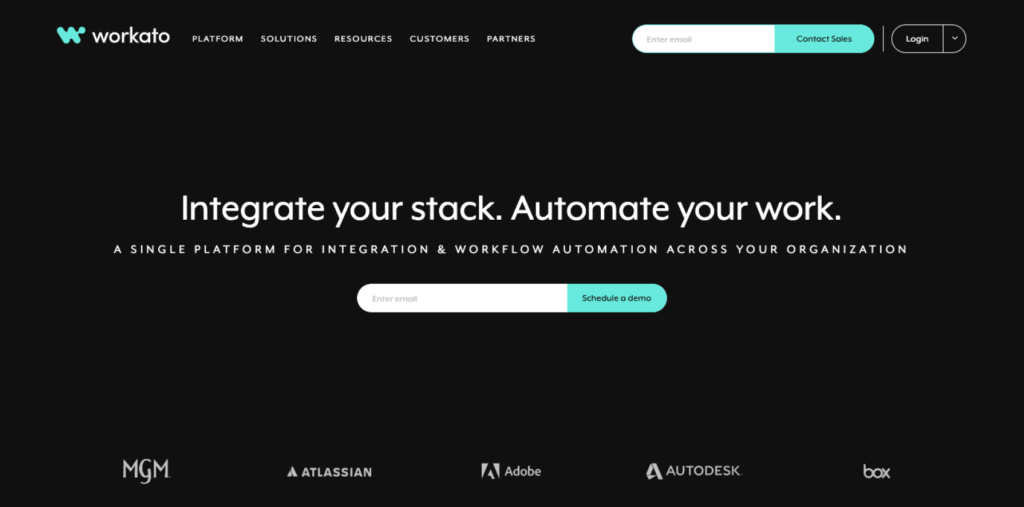
G2 rating: 4.7 / 5
TrustRadius rating: 6.8 / 10
Workato is an integration and automation platform that offers workflow automation, data integration, master data hubs, API management, modern B2B/BPO and conversational UX.
Key features:
A low-code integration platform, Workato offers its users enterprise workflow automation, RPA, smart data pipelines, low-code API management, and enterprise chatbots.
Customers:
Workato’s target audience is the enterprise segment, specifically those in IT, HR, marketing, finance, sales, and product/engineering.
Pricing:
New Workato users can start with a free trial, after which the pricing per feature starts at $10,000 per year.
9. Appian
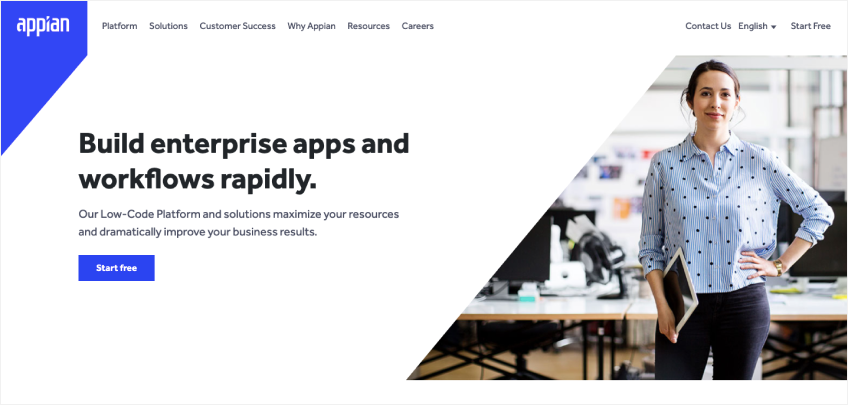
G2 rating: 4.5 / 5
TrustRadius rating: 8.6 / 10
Appian is a low-code development platform that allows businesses to build business process management applications.
Key features:
Being a business process management platform, Appian offers its users low-code application development, BPM, robotic process automation, AI, and intelligent document processing.
Customers:
Appian’s software is suitable for individuals and teams of all sizes in industries such as automotive and manufacturing, energy and utilities, education, financial services, government, healthcare, and others. Because it is a low-code solution, its users must have a certain level of coding skills.
Pricing:
Appian offers several subscription plans depending on the number of users and features available:
- Free plan (up to 15 users)
- Application plan (minimum 100 users, starting from $2 up to $70 per user per month)
- Platform plan (custom quote)
- Unlimited plan (custom quote)
10. DocuSign
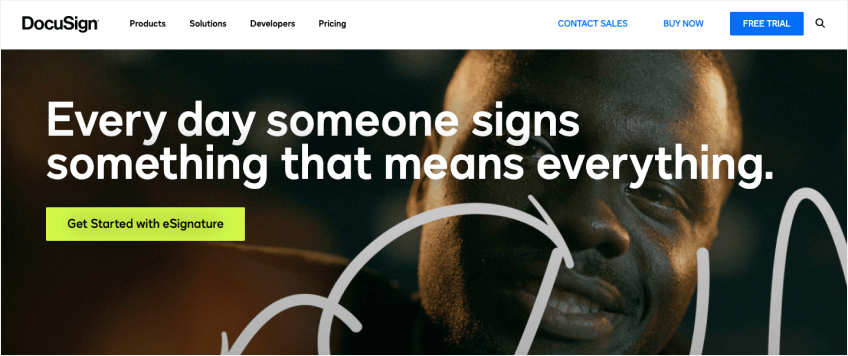
G2 rating: 4.5 / 5
TrustRadius rating: 8.5 / 10
DocuSign is a cloud service that provides eSignature technology for document signing and allows users to create document signature workflows.
Key features:
In addition to an electronic signature, DocuSign offers its users document generation, contract management, and contract analytics.
Customers:
DocuSign is suitable for businesses of all sizes: enterprises, small businesses, and individuals. The software can be used in a variety of industries, including but not limited to financial services, insurance, real estate, government, education, and healthcare.
Pricing:
DocuSign’s subscription plans depend on the number of users and available features, and are divided as follows:
- eSignature plans start from $10 (Personal), $25 (Standard), and $40 (Business Pro)
- Real Estate plans start from $10 (Real Estate Starter), $20 (for Realtors), $25 (Real Estate)
- API plans start from a free plan up to $480/per user (Advanced plan)
Take note: Check out the comparison of signNow vs DocuSign vs Adobe Sign vs PandaDoc to see the eSignature capabilities of the four solutions side by side.
11. HelloSign
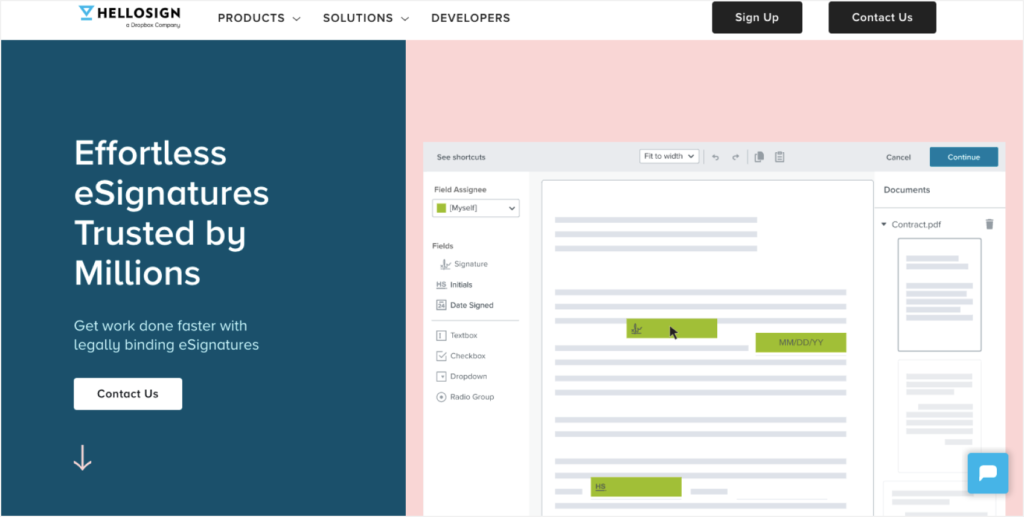
G2 rating: 4.7 / 5
TrustRadius rating: 7.6 / 10
HelloSign is an embedded eSignature and storage solution that allows users to send, sign, and store documents.
Key features:
HelloSign offers its users an electronic signature, HelloSign API for developers, intelligent mobile forms, and online faxing.
Customers:
HelloSign is mostly used by companies with 10-50 employees in the computer software industry that bring in $1-10 million dollars in revenue.
Pricing:
HelloSign’s subscription plan depends on the product you choose. For instance, with HelloSign API, the Test Mode will cost you nothing while Essentials is $75/month, and Standard is $250/month.
12. PandaDoc
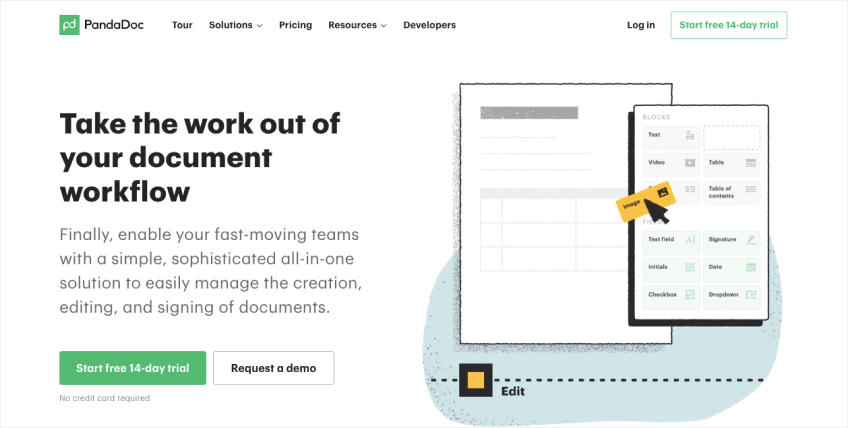
G2 rating: 4.7 / 5
TrustRadius rating: 8.9 / 10
PandaDoc is a document automation software that enables users to streamline the process of creating, approving, and eSigning agreements, quotes, and other documents.
Key features:
PandaDoc offers document generation, tracking, sharing, and eSigning, as well as contract management, business workflow automation, RFP software, marketing automation software, and more.
Customers:
PandaDoc is primarily used by teams and businesses with 10-50 employees that make $1-10 million in revenue in industries such as computer software, IT services, marketing and advertising, construction, financial services, healthcare, and more.
Pricing:
PandaDoc’s subscription plans vary depending on the features available. See the plans below:
- Free plan
- Essentials ($19 per user/month)
- Business ($49 per user/month)
- Enterprise (custom quote)
Take note: Check out the comparison of signNow vs PandaDoc to see their eSignature capabilities side by side.
Most in-demand automation features in 2023
The workflow automation solutions above offer their users a wide variety of features. Here are the most sought-after features that will remain popular in 2023.
1. No-code automation
The world is moving towards no-code automation with citizen developers becoming one of the most marketable occupations of the future. However, not many solutions allow users to build automated workflows without coding. Of the solutions listed above, airSlate, DocuSign, Formstack, HelloSign, Nintex, PandaDoc, and Zapier offer no-code automation.
2. Document generation
Another key feature is the ability to automate the process of creating custom reports, agreements, forms, etc., and to populate them with data from any system of record. Document generation is offered by airSlate, Kissflow, Formstack, Nintex, Appian, DocuSign, and Pandadoc.
3. Contract management
Managing contracts from A to Z is a complicated yet indispensable part of work for departments such as sales and finance. The process includes contract creation, negotiation, and signing. Smooth contract management requires automated document routing and role-based editing tools as well as integrations with external systems, eSignature, and the ability to continue the process on any device to ensure timely approval and signing.
Among the solutions we’ve reviewed in this blog, contract management is offered by airSlate, Kissflow, Formstack, Nintex, Zoho, Integrify, Appian, DocuSign, and PandaDoc.
4. No-code integrations
Just like no-code automation, users are demanding no-code integrations with external systems (like CRMs, cloud storage services, etc.) more and more. Most solutions that offer third-party integrations require users to code in order to complete the configuration. The few solutions that don’t require any coding for this configuration include airSlate, Zapier, Workato, HelloSign, and Pandadoc.
5. Workflow visualization
Users are also looking for the ability to build a visual representation of their automated workflow. The most straightforward example of this is a drag and drop diagram. Only airSlate, Appian, Formstack, Kissflow, and Integrify offer this functionality.
Top automation software 2023: comparison chart
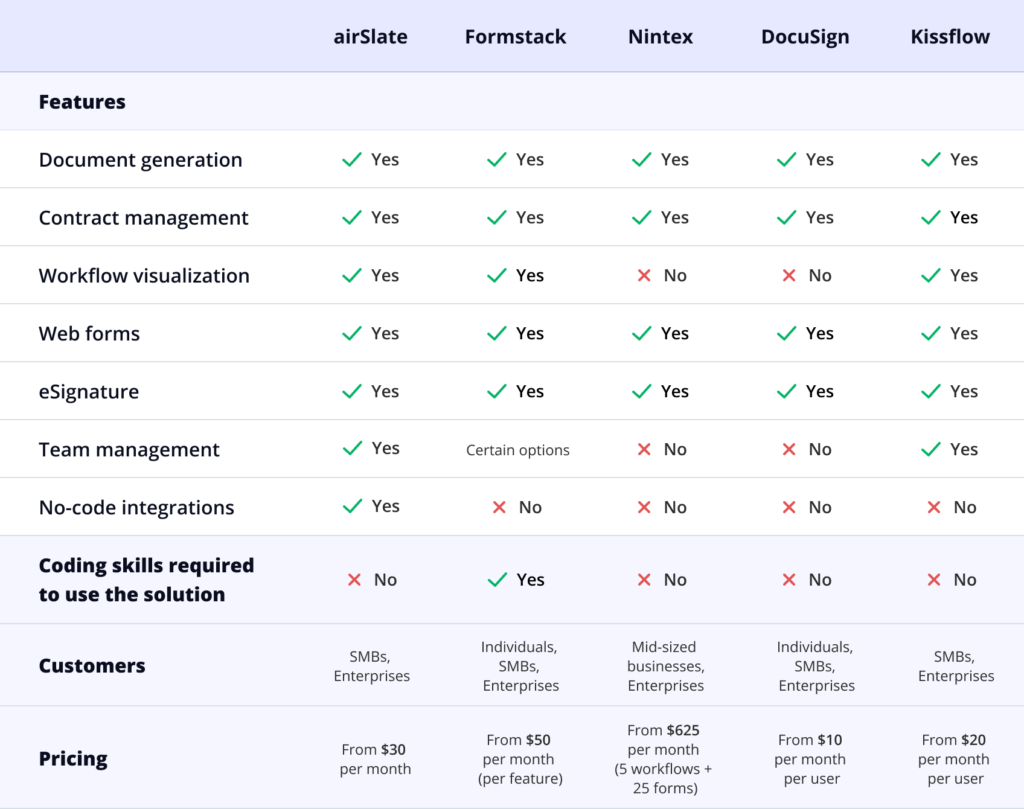
Final takeaways
Workflow automation tools have become a must-have for any business that is looking to scale and grow. It’s up to each organization to decide which software is their best option for automating their business workflows. It is worth remembering, however, that regardless of industry, your business will most benefit from an all-in-one no-code solution in the long run.
Stay tuned! Our upcoming posts will provide you with more information on workflow automation trends and features that will benefit your business.
